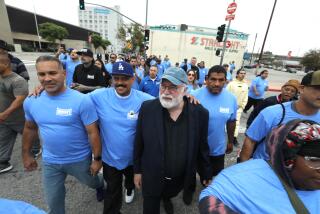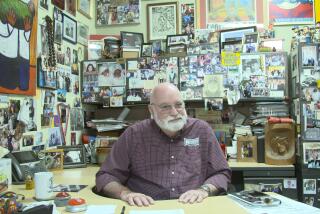Discussion guide for ‘Barking to the Choir’ by Homeboy Industries founder Gregory Boyle
- Share via
Father Gregory Boyle, the founder of Homeboy Industries, has told stories about his experiences with L.A.’s gang members in sermons, speaking engagements and in two nonfiction books.
His latest book, “Barking to the Choir,” is a collection of anecdotes about his daily interactions with the men and women who come to Homeboy for counseling, classes, tattoo removal and shifts at its bakery operation. “Barking to the Choir,” a Los Angeles Times Book Club selection, follows Boyle’s bestselling “Tattoos on the Heart.”
A Jesuit priest and former pastor in one of L.A.’s poorest parishes, Boyle mixes his observations about faith and compassion with inspiration gained from Walt Whitman, Martin Luther King Jr. and Rumi, as well as the ex-gang members and inmates he meets daily. He writes tender stories about what suffering and second chances can do to a person, often with a humorous twist.
Topics for discussion
- What did you know about L.A.’s gang culture before reading the book? Did anything surprise you?
- Boyle describes Homeboy Industries as “representing the heart of Los Angeles.” What is the heart of L.A. to you?
- Boyle began working with gang members three decades ago after becoming pastor at Dolores Mission Church in East Los Angeles and later founded Homeboy Industries, now located on the edge of Chinatown and downtown. In “Barking to the Choir,” he shares the personal stories of “homies” who drop by his office for counseling, write to him from jail, sign up for job training and other programs. Is there a story or person in the book that stuck with you the most? Why did you gravitate toward that story?
- The book combines what Boyle has learned firsthand with teachings from religion, philosophy and literature. Is there any wisdom you will take away?
- The author refers to former gang members as those living life on the margins. What does it mean to live life on the margins?
- A central theme of the book is kinship, and Boyle talks about solutions to society’s problems beyond incarceration. What do you think kinship looks like in action? Why does kinship matter?
- “Barking to the Choir” describes instances in which people challenge Homeboy Industries and criticize the way Boyle aspires to find humanity in all people, no matter their background. What do you make of the criticism?
- In the chapter “Good Guy,” the author writes, “Gangs are the places kids go when they have realized their life as a misery. And who doesn’t know by now that misery loves company? But in thirty years of walking with gang members, I’ve never met a bad guy.” Do you believe in the idea of the good guy and bad guy?
- Toward the end of the book, Boyle writes about interactions between homeboys and police officers. What do those interactions say about the relationship between police and the communities they patrol?
- The author writes: “Homeboy receives people; it doesn’t rescue them. In being received rather than rescued, gang members come to find themselves at home in their own skin.” What places make you feel at home in your own skin?
More information
Author interview: Father Gregory Boyle has an ambitious plan to expand Homeboy Industries.
Inside Homeboy Industries: 5 things to know about Father Gregory Boyle and “Barking to the Choir.”
Column: A homie, a volunteer and a message of radical kinship from Father Greg Boyle.
Your next read: Father Gregory Boyle and other book club authors share the books they couldn’t put down in 2019.
Book Club: On Dec. 16, the L.A. Times Book Club welcomes Father Gregory Boyle for a breakfast conversation with author Héctor Tobar about “Barking to the Choir.” The event includes tours of Homeboy Industries. (The event is sold out.) Sign up for the Los Angeles Times Book Club newsletter for book news and upcoming events.
More to Read
Sign up for our Book Club newsletter
Get the latest news, events and more from the Los Angeles Times Book Club, and help us get L.A. reading and talking.
You may occasionally receive promotional content from the Los Angeles Times.









